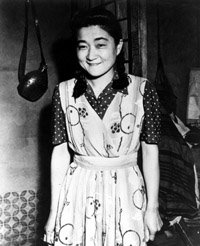
Ikuko Toguri (b. Los Angeles, 1916 - m. Chicago, 2006)
The Sept. 26 died at age 90 Iva Toguri d'Aquino, better known at home and Tokyo Rose, the name by which the relationship from the forties and do not really belong to anyone. Tokyo Rose was named as the Allied soldiers who fought in the Pacific during World War II to the announcers propaganda programs and psychological warfare issued by the Japan government. And would the Japanese version of the famous Axis Sally or later Hanoi Hanna of the Vietnam War. In reality, the announcers were several, but the old woman who has just died will be remembered by that name for what happened after the war and has more to do with the ability of media to create a myth and / or a scapegoat in specified circumstances, any history of espionage and treason.
Iva (born Ikuko) Toguri, California came into the world on American national holiday in 1916. Japanese traders daughter emigrated to America, studied zoology at UCLA, then worked in the import business from their parents but wanted to study medicine. In July 1941, his mother sent to Japan to care for his sick sister, so that the attack on Pearl Harbor surprised in a strange country where hardly speak the language. Beset by Japanese police, refused to renounce their nationality, and began working as a typist at Radio Tokyo to survive. There he met the greatest Australian Charles Cousens, famous radio in his country, which had been taken prisoner by the Japanese and worked with them in their propaganda broadcasts. Cousens looking for voices for Zero Hour program aimed at Allied soldiers in the Pacific front, and Iva began working for him in 1943, radio news and music under the pseudonym Orphan Ann. Actually Cousens and colleagues tried to do as little damage as possible with their "siren song" and did so well that the secret services allies acknowledged at the end of the war that these programs not only do not adversely affect the morale of the troops, but the rising
After the war, Iva Toguri, who in 1945 had married a Japanese man of Portuguese origin, Felipe Aquino, began to consider returning to the United States, but was left without means to do so because they had traveled Japan without a passport. In September 1945, some American journalists offered a reward to anyone who knew anything about Tokyo Rose, and a companion radio informed them that it was Iva Toguri. At first he offered money for her story, admitting even signed a contract to be Tokyo Rose met with the idea of \u200b\u200breturning to the United States. However, reporters complained to the American counter-espionage services was detained and investigated by the FBI and allied intelligence, without being guilty of anything (in fact they knew there was Tokyo Rose) as she was released . The following year he again requested a passport to return to his country, which came the ears of some veterans' associations and the media, especially the journalist Walter Winchell , who organized a campaign that raised public opinion and convinced the State Department to re-arrest, which Iva Toguri returned to his country 1948 accused of treason. The trial took place in 1949. Previously, U.S. officials had sought witnesses and evidence, as most were destroyed after the first FBI investigation that found innocent. In the process some irregularities occurred, it was discovered that he had paid to witnesses who were never removed and tests were inconclusive, but the pressure media and the public ended up doing that the defendant to 10 years in prison for only one of eight charges of treason for which he was charged.
In 1956 he was released from prison, reduced his sentence for good behavior, and had to confront the government tried to deport her, this time won.
In 1976 the television program 60 Minutes told the story from the point of view of the protagonist, making public opinion changed in his favor, and getting President Gerald Ford finally exonerated the following year. In 1980 she divorced her husband, who had never been able to respond to the United States. Felipe D'Aquino died in 1996. From 77 Iva Toguri d'Aquino did what he had been denied for so many years, living a normal life, taking the family business until he died last Tuesday in Chicago.
No comments:
Post a Comment